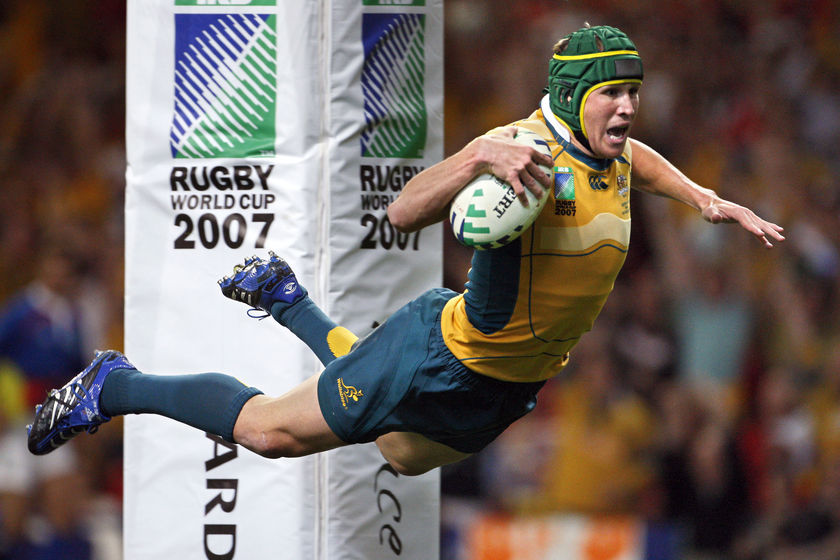Can Australia Win The Tri Nations?
If one was to believe the talk coming from sections of their local media and the former playing ranks of Australian test players, then we are witnessing the birth of a new golden age for the Wallabies.
Certainly, on the evidence of their opening home tests against the Barbarians, Italians and French, they are debatably the most impressive looking side in the world as it stands.
After all, their arch nemesis, the All Blacks, are effectively limping into the Tri Nations competition. They have been without the services of so many of their pillars, and even those who are returning, have played precious little top level rugby in recent months.
The Springboks, while basking in the celebrated glory of winning a Lions tour, did not endear themselves to the rugby neutrals by dominating the fabled tourists. If anything, they may view the Tri Nations as a distinctly secondary task to that of which they have just accomplished, and may not be hungry coming into the Southern Hemisphere’s showpiece championship.
But hunger is something that this convalescing Australian team looks to have in spades.
Robbie Deans is a truly brilliant rugby coach, whose record as the overlord of the Crusaders was unrivalled by any other in the global rugby ranks.
A man who can put no foot wrong, he is making all the right noises in the Australian rugby fraternity, but even more importantly, is getting the best out of his players.
The straight talking former Christ’s College boarder pure rugby views are vastly different to the almost autocratic or hands off approach of former Australian test coaches, and to say that this generation of Wallaby players are reacting positively would be a dramatic understatement.
In 2009 under Deans, who did not have to concern himself with Super rugby coaching unlike last year, the Wallabies have looked methodical and well organised.
It is like he is moulding the Australian test team in the cast of the famed Crusaders champions of the past.
But to avoid a cliché, the real judgement is about to be passed, not only on the Wallabies, but on Deans himself.
After all, for all of his success as the Crusaders coach, he does have his blemishes as an elite coach.
In 2001, a year after taking over from Wayne Smith; who had just completed a hat-trick of titles with the Crusaders, and the same year he devoted his attention to solely coaching the red and blacks (having coached Canterbury in 2000 along with the Crusaders) his decorated team came 10th in the competition, their second worst year in Super rugby history.
He was also John Mitchell’s assistant with the All Blacks from 2001 to 2003, a reign that had a huge amount of success, but fell at the biggest hurdle, losing ironically to the Wallabies in the semi final at the 2003 World Cup.
While no doubt part of Dean’s current magic with the Wallabies is ingraining them with a huge amount of self belief, four early season test wins does not make a great rugby team.
On the final pessimistic note, let us not forget the Deans lost three times to the All Blacks last year, oversaw the Wallabies worst ever test loss, lost to Wales for only the second time since 1987, and only narrowly defeated Italy, the 12th ranked test nation in the world.
There is though now an unwaveringness in this test side, but most importantly, and unlike their Tri Nations opponents, no discernable weaknesses.
With Captain Stirling Mortlock, George Smith and Matt Giteau, they have three of the best players in world rugby. The outgoing Western Force and incoming Brumbies playmaker is currently the finest number ten on the global stage.
Adding to this is much contravention to traditional Australian faults, with the Wallabies possessive of as much depth as we have ever seen, and with their forward stocks burgeoning, there is certainly much to like about this team.
But they haven’t done anything yet, and that is why they probably approach the Tri Nations with expectations even beyond that of their illustrious opponents.
Between them, the All Blacks and the Springboks hold all the titles.
New Zealand, current champions, could almost be expected to concede a tournament title that they have virtually owned. After all, they are rebuilding more than any other test nation, and have numerous injuries. But some curious optimists in New Zealand may even welcome the All Blacks having a less than spectacular 2009, thinking better now than in 2011?
And South Africa has just earned another title with a four year battery life. Irrespective of what they achieve between now and 2011/2013, they are the World Champions and current Lions series winners.
The Wallabies must have a goal of winning at least one of the Tri Nations or Bledisloe Cups.
Otherwise, their apparent progress will be nothing more than a mirage.

